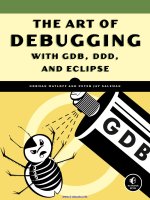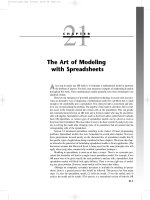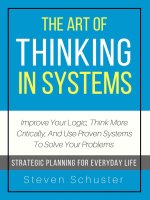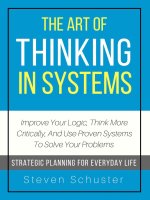Live below your means the art of living with very little money
Bạn đang xem bản rút gọn của tài liệu. Xem và tải ngay bản đầy đủ của tài liệu tại đây (3.6 MB, 126 trang )
Live Below Your Means:The Art of
Living With Very Little Money
(Occasionally illustrated of course.)
By Micah Coulter
Disclaimer
What you do with this information is your legal responsibility.
The author or publisher is NOT responsible in any way for any loss of life,
any crime committed, any injury, loss of wealth, damage to property, or
anything else that may occur when using the information in this book. Don’t
buy something or do something because this guide suggests it and then blame
the book.
If you don’t like an idea, don’t follow it!
Use your own common sense and personal tastes as this guide is only for
informational purposes.
Contents
Everyday Cheap Living
Save Money on Low Income
Save Money on Food
Cheap Recipes
Save Money on Hygiene
Save Money on Cleaning Supplies
Save Money on Clothing
Save Money on Utilities/Doing without
Save Money on Shelter
Save money on Furniture
Save money on Home Security
Save Money on Transportation
Save Money on Entertainment
Save Money on Healthcare
Save money on Losing Weight and getting Fit
Passive Income
The Art of Free and Recycling
Fire from AA batteries/Cell phone
Frugal Troubleshooting
The Frugal Shopping List
Conclusion
Introduction
If you’ve lost your job, you’re struggling to pay bills, been laid off, live on a
fixed income, or are living on a single income: you’ve now found the book to
help you make changes in your life. In this book, we’ll discuss all the little
details from homemade cleaning supplies and hygiene products to learning
how to improvise items and save money on groceries.
From a former homeless man’s perspective:
You don’t have to have a ton of money to be happy. Some of the richest
people in the world are depressed and miserable.
Why? You thought with all that cash and the ability to do whatever they
wanted would always make them happy? Why are they not? Don’t look at
money as the answer for your happiness. A lot of people have too much of it,
and they are never happy.
Remember:
The best things in life aren’t what money can buy, but the simplest of things
which cannot be bought, like health and well being.
Learning to enjoy the small things in life is where the true wealth lies. The
morning rain, a warm cup of tea in the winter, playing with a warm little
puppy; That makes life good.
Don’t let money get you down, it was always meant to be spent. Money
comes and goes, but your time cannot. You have this one single life on earth
that you’ll never have again, why spend it chasing a piece of paper?
Life will throw curveballs and will knock you down. Get back up with a
smile and remember that the key to happiness is being present in the moment.
Yes, you’re in debt but so is everybody; that’s how this system works. You’re
in debt from your eighteenth birthday until the very day you die. You’ll never
pay it all off no matter what you do, so don’t stress too much about it.
You might be thinking, “Sure, I can pay all my debts.” Even if you own your
own home, vehicle, yacht, or whatever- you’re still in debt to the government
by taxation on those items. Debt is unavoidable, so don’t prioritize it above
your family and your well being.
There are people the world over who have gotten by with less, and so can we.
We don’t have to live lavish lifestyles. You can have your cake and eat it too.
Starting out, take a look at all the items you have around you. If you’re like
anybody else in these modern times, you likely have a large HD television,
nice clothes that you bought brand new, and maybe a few subscriptions to
video apps that you rarely use except on the weekends when you’re not
slaved to death at your job. Then just like myself and everyone else, you have
the audacity to complain as to why you can’t make ends meet. People are on
antidepressant medications and stressed out of their minds despite having all
this luxury. Do you know why? Money. Bills. Debt.
They try to go out and numb the pain with alcohol. Some turn to drugs, others
turn to eating. Most sit and stare at screens to distract themselves from the
absurdity of it all.
Everyone is looking to feel something again, and no matter who you are; you
escape one way or another. Either by hobby or drugs, food or pills; caught in
the cycle of working just enough to feel free, but feeling too tired to be
anything but complacent at the end of the work day. Where is the logic in
this lifestyle?
Here’s the solution to those problems in one simple statement: live below
your means.
My grandfather Joe sat me down one day as a young man and gave me some
advice.
“If you want to save money, you’ve got to live below your means.” I didn’t
grasp what he meant by that then, but I’ve come along way since that time.
Ask yourself this: did you really need that overly expensive HD television
with 1080p resolution, that wall mount kit, and those surround sound
speakers? Of course not. Sure, you worked for it. Sure, you can do as you
please.
But as you sit there staring at all that, be honest with yourself. What would
you rather be doing?
In a quote from Charles Long, “Who said ambition has to come from your
job?”
Everyday Cheap Living
Get up with a game plan
Wake up in the morning with gratitude and intention. Most successful people
start the day with intention. Either you’ll accomplish something today, or
you’ll achieve something. It doesn’t have to be elaborate, it could be as
simple as going grocery shopping.
Unplug unnecessary appliances
One of the first things my wife and I do is unplug our phone chargers after
getting out of bed. Those things basically sit around drawing unused power.
This can be applied to nearly everything in your house. Hair dryers, fans,
televisions, stoves, coffee pots, air conditioners, game systems, washers and
dryers, etc.
I practiced this routine daily for an entire month. I unplugged everything that
wasn’t in use, minus the refrigerator.
I saw a decrease in my monthly electricity bill by $4.00!
Eat lightly
Unless medical conditions prevent you from skipping meals or otherwise,
consider eating something very light for breakfast. It could be a banana and a
cup of coffee. It could be a bowl of oatmeal and a cup of tea: anything that
you can eat.
For lunch and dinner, make only what you will eat. Usually in portioned
amounts. Keep any leftovers for a meal the next day. Don’t throw away your
leftovers or keep them with only the intention of eating them. The only thing
that results from that is rotten food and wasted money.
On coffee or tea
Limit yourself to one cup a day. It’ll save you a lot of money in the long run
as opposed to heavy coffee drinkers. Both of these beverages are luxuries and
expensive ones at that. Just one cup. If the stuff in the pot is a few hours old,
drink it anyway. Your fellow man worked hard to produce that coffee for
you.
You and cheap living
It’s up to you to pinch every penny and learn to be resourceful. This guide is
expansive, but none of this information is going to do you any good if you
don’t have a little self control. It’s hard when you go out to the store to buy
something, and then you end up coming home with five things you didn’t
need and a new shirt they had on clearance.
You have to have control of yourself if you’re ever to succeed in saving.
Cheap living is a way of life, and it can be tiresome trying to pinch every
little penny you can get.
Still, that’s a penny you can put back and save. One-hundred pennies is a
whole dollar.
Think about it.
Your Dignity
Just because you’re poor doesn’t mean you have to show it. You could bathe
regularly, You could wear secondhand clothes, work a minimum wage job,
eat healthy, and look middle class: all on less than $1,400 a month.
You don’t eat from trash cans just because you’re poor. You can get
comfortably by on barely anything if you do the math and play your cards
right. Even if you did dig something out of a dumpster, it doesn’t make you
any less of a human being. We all have to survive regardless, and we’re all
worthy of love.
The best part about having barely anything is that it makes you rich both
mentally and spiritually. You wake up with less bills to worry about. You
spend less time at the office; you just work eight hours and done.
Sure, the work is hard; yet you’re thankful to the powers that may be for your
opportunity to provide for yourself.
Being poor does not take away your dignity. If anything, having very little in
wealth means you have much more wealth in another greater sense.
That’s the beauty of cheap living.
Save Money on Low Income
Save a little money each paycheck
Besides not spending any money other than what is utmost necessary (Ex.
Utilities, Rent, Insurance, Groceries) and saving what you can, you can amass
a large some of money over time. In order to save money, you must first sit
down and distinguish the money from which you can spend and from which
you cannot. You must find your monthly wage. In order to do that use the
math formulas provided below. Gross means a sum without taxes factored.
Ex:
1. Hourly income x hours worked in a week = 1 weeks wages (gross)
2. Weekly wages x 4 (four weeks in a month)= monthly wage (gross)
3. Monthly wage x 12 = annual wage (gross)
Determine the sum of all your bills for each month. Subtract the amount from
your monthly wage.
Ex:
1. Monthly wage - bills = potential savings
2. Potential savings - grocery budget = savings
Whatever money you have leftover after deducting the sum of your bills from
your monthly wage, can be further deducted from by your grocery budget
(I’ll help you determine your budget in the next chapters) to produce what I
like to call “savings”.
Basically it’s money that you could do absolutely anything with, but should
save.
Place the money “savings” into a savings account at your preferred bank.
You’ll continue to do these math calculations every single month to
determine what you can potentially save so that you can actually do it.
As you know, your pay could fluctuate depending on whether or not you get
sick, skip work, call off or just work less hours.
Do you have any bad habits?
I’d advise if you are trying to save money and have any unnecessary bad
habits, to do away with them. After all, they are the reason you’re struggling
to get ahead, whether realized or not. They are taking a chunk of your
money. Calculate using the formula below if you don’t believe me.
Ex:
1. Bad habit price x amount consumed per week = weekly expense
2. Weekly expense x 4 (four weeks in a month) = monthly expense
3. Monthly expense x 12 (twelve months in a year) = annual expense
Unfortunately, you’ll have to further deduct the monthly expense of your bad
habit from the potential savings.
Ex:
1. Potential savings - monthly expense = savings
Whatever is the difference between the expense and potential savings is what
you’ll be able to save each month.
Save Money on Food
Make a household item list
Every item you use in the house including food should be written on a piece
of paper. Go over the checklist weekly with each individual item, and decide
what you do and don’t need for the rest of this week.
Are you out of something or not?
If you are almost out of something or already out, write it down on your
grocery list for that week. If you have enough of something and you don’t see
running out of it within the next week, don’t write it down.
Don’t shop hungry
Going in to the grocery store hungry is asking to overspend. You’re likely to
be more impulsive and not think things through when you’re hungry. Grab a
quick bite at home before heading out.
Don’t “dine out”
Even if it’s only a dollar spent. The food you have at home is more than
enough, plus your already spent money on it.
Make a list and stick to it
Develop an affordable and rational grocery list suited to your diet, and stick
to it. Try to keep it as healthy as possible. Avoid pre-made food and heavily
processed foods. Stick to whole foods.
Buy only generic
Name brand foods are more expensive, and it’s the same thing you get if you
pay generic. I have found that generic items seem to sometimes have more
chemicals, but this is only an assumption I’ve developed from comparing
food labels.
Make a grocery budget
Name a price, and find a way to fit what you need around it. Avoid buying
anything that’s not on the list and shop with a calculator if you have to.
Shop at $1 stores for household needs
$1 stores are great for finding household dishes and some cooking utensils all
for just 1.00. You can even decorate an entire house with some of the items
you can find in a $1 store.
Affordable supermarkets and salvage
Find the store in your area with the best food deals related to your grocery list
and then buy them. Salvage stores are also best if you find any in your area.
Use a calculator when shopping
My clever wife taught me this. How in the hell I didn’t think of it before is
beyond me.
Simply take a calculator in the store with you with your budget entered.
As you add each item to the cart, deduct its store price from your budget until
you are left with no more money.
At that point, decide what is necessary and what you can do without that
week.
This keeps everything down to basics and allows you to stick to your budget.
Pay with cash
Similar to the calculator idea. Go into the store with a set amount of money in
cash and make your groceries fit to that amount.
Can be slightly embarrassing if you miscalculate and have to put something
back at the register.
No junk food or sodas
Sodas and sports drinks are nothing but sugar and unneeded calories and
basically the same thing. Even the diet kind are often full of chemicals.
I personally haven’t drank a soda in over 7 years, as they are terrible for the
kidneys. Drink water instead. You’ll save money and actually be putting
something in your body that it was meant to filter.
Your kidneys will thank you later in life too.
As for the junk food, you can treat yourself occasionally, but don’t live off of
the stuff. It’s often full of sugar, salt, and unnatural oils. Yes, it’s usually
cheap.
The real cost is your health from years of eating it and you end up with a big
medical bill.
Everything in moderation.
Weekly checklist
Go over your grocery list and determine what you do have and don’t have. If
almost out or out of, add to shopping list. If you still have half or more, wait
until next week.
Buy clearance
Check the clearance section every time you go to the store and try to make a
habit of it.
Often you may find good deals on stuff you normally buy if you are diligent.
If you find something that you use a lot of, be sure and buy extra so that
you’ll pay less for it in the long run.
Can your own food
If you have the know how and some mason jars, you can can your own food
that you grow in the garden and preserve it for later.
You can make homemade jellies, jams, soups and whatever else and simply
can them and save them for later. A great way to save money, especially
when cooking large pots of beans and then canning them for later. Be sure
and mark the date you canned them on a label and place it on the jar
somewhere. Don’t eat very old cans of food, and if you do, be sure it’s sealed
properly.
Live off the land
Something my grandmother did all her life and taught me how to do as a
young boy was gardening. Through it, you feel closer to the earth.
It teaches you many life lessons, like patience and responsibility: especially
during the summer droughts. We typically had to water all the plants by hand
because we had no rain. It taught me to respect and care for other living
beings, and in return they fed me with their fruits and vegetables.
Not only can you grow a garden, but you can also learn to eat wild edibles
and how to identify them. This is risky because if you misidentify a plant that
has a poisonous look alike, you could get gravely sick or worse.
Luckily Dandelions are easy to remember and are good for you. There are
several plants out there that have no known look alikes and are incredibly
healthy to eat.
And while we’re on the subject, yes you can also can wild edibles.
Hunting/Fishing
You can take up hunting and fishing both as a peaceful past time and a way
to put meat on the table.
Learning to process your own meat and preserving it can be a rewarding
experience and make you feel as though you’re in touch with the earth.
Personally, I don’t believe in hunting for sport; and no, I do NOT enjoy it.
Taking the life of another living being for food is nothing enjoyable.
Personally, I believe if you’re going to hunt it, then you should eat it. If
you’re not going to eat something, don’t deny it of it’s right to live.
I rarely hunt anymore as I do not see the need for it. These days my diet is
mostly vegetarian. Mainly because meat is too expensive; the other reason
being I don’t like meat.
Dumpster dive
I used to hitchhike from town to town and I did so living entirely by what I
found in the dumpsters of local stores.
Weekly, stores throw out all kinds of food, clothing, electronics and all sorts
of other goodies that are ripe for the picking. Sometimes you get lucky and
sometimes you don’t.
Dumpster diving is dangerous and you could easily get injured so only do it if
your life depends on it.
Also, don’t mess with enclosed dumpsters or any dumpster that has locks.
You could be charged with breaking and entering or trespassing and end up
doing jail time.
You also don’t know why the food was thrown away. Often it’s just because
it’s close to the expiration date.
There is sometimes a chance that it was thrown out because there is a safety
recall, and eating it could make you deathly sick.
Try to keep up to date on safety recalls if you can.
If it’s not locked and not on private property, then have at it.
You know the risks, don’t be careless!
Wild edibles
Nature provides natural foods for us as well.
These are the most common wild edibles in Eastern North America and are
quite easy to identify.
NEVER EAT ANY PLANT WITHOUT KNOWING ALL OF THE POSSIBLE RISKS.
DO NOT EAT A PLANT WITHOUT POSITIVELY IDENTIFYING IT.
PLANTS ON THIS LIST MAY REQUIRE EXTRA PREPARATION TO BECOME EDIBLE.
SOME PLANTS MAY BE TOXIC UNLESS COOKED.
IT IS YOUR RESPONSIBILITY TO DETERMINE WHAT IS SAFE TO EAT.
IF YOU ARE UNSURE, DON’T EAT IT.
Dandelion (Taraxacum Officinale)
source:
/>
Edible: Leaves, roots and flower. Roasted root acts as coffee
substitute. Too much consumption acts as a laxative. Roots and
leaves can be dried and stored and used as tea.
Locations: Waste Areas, lawns, roadsides, fields, wood margins,
virtually everywhere.
source: />
source: />
Wood Sorrel (Oxalis stricta)
source: />
Edible: Entire plant can be eaten raw or cooked. Delicious flavor. Mildly
sour. Can be used to make tea which helps relieve indigestion in moderate
doses. Great source of vitamin C.
Astringent.
Locations: Shaded, moist soils. Often found near wild onions, common on
forest floors near the bases of trees.
source:
/>
source: />
Broadleaf plantain (Plantago Major)
source: />
Edible: Entire plant. Young leaves, raw or cooked.
Old leaves better cooked. Seed can be ground into meal and mixed
with flour. Dried leaves make healthy tea.
Location: Grows low to the ground, common in yards, lawns,
gardens, fields, meadows, pastures.
Source: />

![live audio [electronic resource] the art of mixing a show](https://media.store123doc.com/images/document/14/ne/fl/medium_flf1401588846.jpg)







